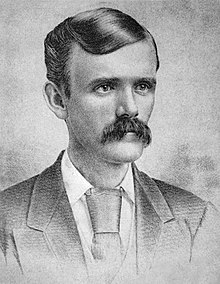Thomas Payne Westendorf | |
|---|---|
 | |
| Born | February 23, 1848[note 1] |
| Died | April 19, 1923 (aged 75)[10][11][12] Chicago, Illinois, US |
| Burial place | Mount Greenwood Cemetery[5] |
| Monuments | Memorial plaque at the Indiana Boys School and a building named in honor.[13][14][4] |
| Occupations | |
| Years active | 1871 – 1915 |
| Known for | Wrote one of the most famous American ballads "I'll Take You Home Again, Kathleen" and hundreds of other musical pieces. Was one of the first educators to introduce music lessons in reformatory schools. |
| Notable work | "Oh Gib Me That Watermelon", "I'll Take You Home Again, Kathleen"[14] |
| Spouse | Jane Morrow (married 1873 – 1915)[7][21] |
| Children | 2[22] |
| Signature | |
Thomas Payne Westendorf (February 23, 1848 – April 19, 1923) was an American songwriter, composer, and educator. Westendorf wrote around 500 musical pieces and songs, but was most famous for his hit song, "I'll Take You Home Again, Kathleen." It was the only Westendorf song that lived long enough to receive rights protection renewal. It was republished many times throughout the years and sung by singers including Elvis Presley, Mitch Miller, Bing Crosby, and Johnny Cash. "I'll Take You Home Again, Kathleen" was listed among the most popular American ballads in 1887, and gained recognition as one of the most beloved songs in music history. It was included in a number of musical collections and used in motion pictures, including Mrs. Parkington and Magic Town. It even made a brief appearance on an early episode of "Star Trek" (September 29, 1966).
Despite the fact that Westendorf became recognized in musical circles and received income from composing, he choose to continue his career in education.
As an educator, Westendorf occupied positions of a teacher, musical tutor, and superintendent in a number of reformatory schools across the U.S. His longest position was as superintendent at Chehalis Reform School. He was one of the first educators to start teaching music in reformatory schools. Westendorf led successful boy choruses, male quartets, and glee clubs in many institutions. His work at reform schools received mixed feedback and often drew controversy. On one hand, many children who studied under Westendorf's supervision were paroled and led successful lives. By some accounts, he managed public funds responsibly and the institutions under his management were praised as model schools. On the other hand, in many cases Westendorf was forced to resign his positions, and often moved from state to state. The reasons for his resignations were unclear, controversial, or accompanied by unspecified "charges."
- ^ Wight 1936.
- ^ Fleshman 1969.
- ^ Indianapolis News; Sep 22, 1928.
- ^ a b Indianapolis Star; Sep 22, 1929.
- ^ a b Lambert 2011.
- ^ Fitzgerald 2002.
- ^ a b c d Prosser 1903, v.I, p. 280.
- ^ a b Jones 2006b, p. D6.
- ^ a b Hill 1948, p. 350.
- ^ Chicago Tribune; Apr 21, 1923.
- ^ Chehalis Bee Nugget; Apr 27, 1923.
- ^ Chicago Tribune; Apr 20, 1923.
- ^ Hill 1948, p. 344.
- ^ a b Indianapolis News; Sep 21, 1929.
- ^ a b The Pantagraph; Mar 3, 1888.
- ^ Hill 1948, p. 338.
- ^ Hill 1948, pp. 343–344, 351.
- ^ The Pantagraph; Jul 19, 1889.
- ^ Fleshman 1965b.
- ^ Friday Harbor Islander; Mar 5, 1896.
- ^ Bauer 1969, p. 28.
- ^ Hill 1948, p. 345.
Cite error: There are <ref group=note> tags on this page, but the references will not show without a {{reflist|group=note}} template (see the help page).
© MMXXIII Rich X Search. We shall prevail. All rights reserved. Rich X Search
